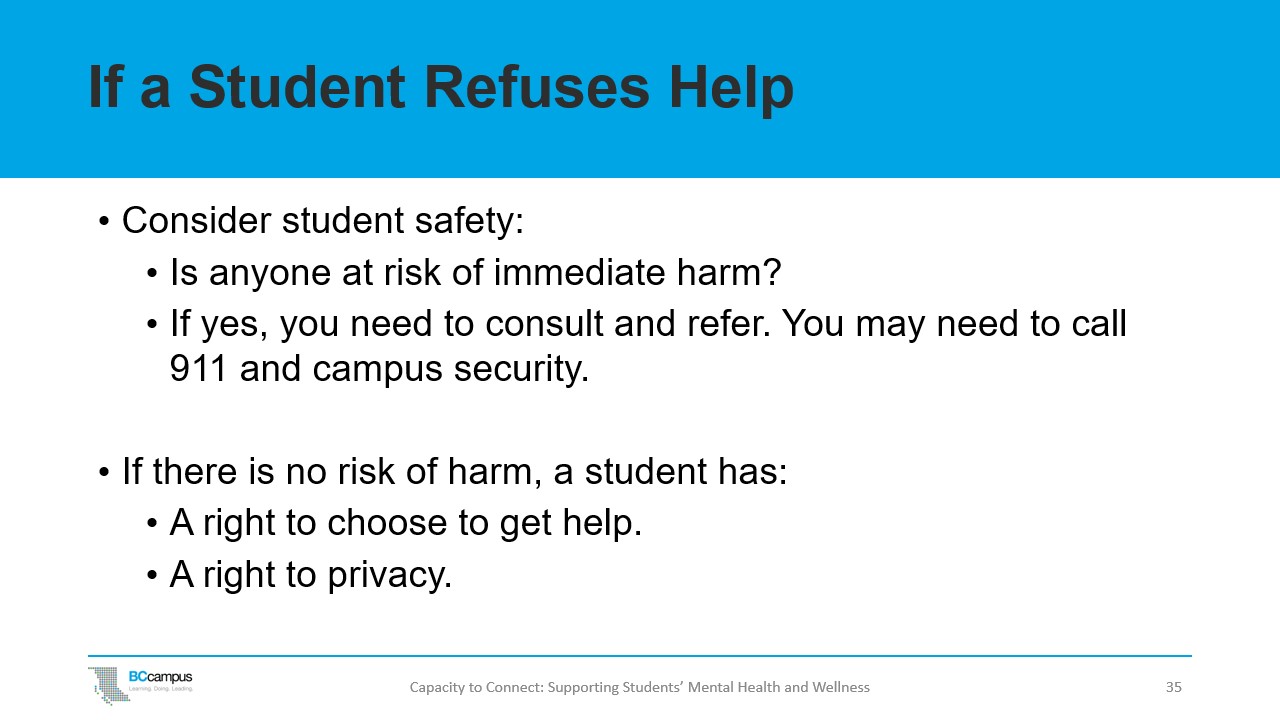These slides are available for use with this section of the presentation. For information about downloading presentation slides, see Introduction.
Refer
Let’s talk now about the third R, referring students for further support. Often a few minutes of effective listening are enough to help a student feel cared about. If their distress is more significant and they are open to accessing more support, there are several services that can help. Knowing what these services are and how to contact them will help you in your role.
Services and Resources at Your Institution

If you have a list with names and contact information for these services at your campus, share this information with participants.
Below are some of the services available at most campuses.
- Counselling services help students manage personal, academic, and life concerns. Professional counsellors provide individual and group counselling sessions for students.
- Campus security helps coordinate responses to student emergencies and crises. If you call 911, call security first, as security can help first responders locate you.
- Indigenous student centres offer programs, mentorship, and a gathering place. They may have an Elder available to talk to students.
- Health services offer health and mental health care for students.
- International student services help students with personal or academic issues, study and work permits, and visa applications.
- Accessible learning centres provide services, coordinate academic accommodations for students, and act as a resource to work with the university community.
- Financial aid helps students needing financial support for their education.
Provincial Crisis and Support Lines

Some larger campuses have a crisis line for students. If your institution does not have this service, there are also provincial crisis and suicide lines that have 24/7 support. These crisis lines also provide support to anyone who is helping a student in distress and needs to talk to someone and debrief.
Some provincial supports include:
- BC Suicide Line: 1-800-784-2433 (1-800-SUICIDE)
- Mental Health Support Line: 310-6789 (no need for area code)
- Here2Talk: 1-877-857-3397 (a 24-hour phone and chat counselling support for B.C. post-secondary students that offers free, confidential counselling and community referral services via app, phone, and web: Here2Talk)
Provincial Supports for Indigenous Students
- For Indigenous students, the KUU-US Crisis Response Services (24/7) provides culturally safe support: 1-800-588-8717
- The First Nations Health Authority website has Indigenous resources: eHealth & Virtual Health.
If You’re Concerned for a Student’s Immediate Safety
If it’s an emergency situation, such as the student has taken pills, is experiencing psychosis, or is a danger to themselves or others, call 911 and campus security.
If it’s not an emergency, but you are concerned, it can be helpful to offer to contact support services on the student’s behalf while they are with you. You may also offer to walk with the student to counselling services.
If the Student Won’t See a Counsellor or Seek Help

Sometimes a student may not want to see a counsellor or refuses help.
Your first step in these cases will be to consider safety: is anyone at risk of immediate harm, whether it’s the student or someone else? If so, share your concerns with a counsellor or someone who can help ensure safety. If a student expresses thoughts about suicide, you don’t have to carry that knowledge alone or assess the risk yourself – consult, refer, and if the risk is imminent, then contact emergency services.
If there is no risk of harm to anyone, keep in mind that ultimately it is the individual’s right to choose whether to seek help. Individuals are resilient and often come to their own solutions or find their own supports when they are ready.
Ensure you are supported! Talk to friends, family, other instructors, an Elder, or a counsellor to share your concerns and decide how to proceed.
Privacy
Please be aware that if you refer a student to Counselling Services and are hoping to follow up to find out about the student, it is up to the student to give consent to release information.
Unless a student gives permission, faculty and staff won’t be notified of what has happened.
Text Attributions
- This chapter was adapted from Capacity to Connect: Supporting Students from Distress to Suicide. © Vancouver Island University. Added “Services and Resources at Your Institution,” “Provincial Crisis Support Lines,” “Provincial Support for Indigenous Students,” and “Privacy.” Adapted by Barbara Johnston. CC BY 4.0 license.

